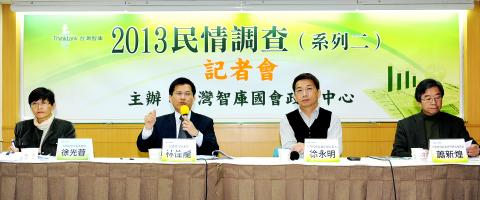More than 60 percent of respondents said they would vote in a proposed national referendum on the Fourth Nuclear Power Plant in New Taipei City’s (新北市) Gongliao District (貢寮) and almost 70 percent of those polled supported the suspension of construction and operations at the controversial power plant, a survey released yesterday showed.
The survey, conducted by Taiwan Thinktank from Feb. 2 until Monday, found that a majority of the respondents favored the anti-nuclear cause and stood on the opposite side to the government, which supports completing construction of the power plant.
When asked if they would vote in the referendum, 63.4 percent said they would vote and 18.7 percent said if they would if they could. If the referendum failed, 74.1 percent of those polled said the government should still suspend construction of the plant.

Photo: Chang Chia-ming, Taipei Times
Almost 70 percent of respondents said they would vote “yes” in the Chinese Nationalist Party (KMT)-proposed referendum, which would ask voters if construction and operations of the power plant should be suspended, with 16.6 percent saying they would vote “no” and 13.9 percent undecided.
Respondents were also suspicious of the government and state-owned Taiwan Power Co (Taipower, 台電), with 84.3 percent saying the government had not provided the public with sufficient information on nuclear energy and 66.5 percent saying that Taipower and the Atomic Energy Council were no longer credible sources of information.
The poll also found that more than 80 percent were concerned that a nuclear disaster could happen in Taiwan and 72.7 percent of those polled said they supported the nationwide anti-nuclear demonstration held on Saturday that attracted an estimated 200,000 participants.
People’s concerns about nuclear safety were so strong that 71.6 percent said they would still oppose completing the construction of the plant even if electricity prices would have to increase by 10 percent as the government has claimed.
Asked about the Referendum Act (公民投票法), 63.2 percent said the current threshold is unreasonably high and 63 percent said they would apply for absentee voting if the mechanism is adopted in the referendum.
Meanwhile, respondents also said they were unfamiliar with and lacked confidence in Premier Jiang Yi-huah (江宜樺), who was inaugurated last month, with 40.3 percent saying that Jiang would not be able to turn the economy around and 51.6 percent saying that they were not confident about the Premier’s pension reform plans.
Jiang’s approval rating was 23.7 percent, with a disapproval rating of 38.3 percent, while 38 percent said they had no opinion.
When asked about who they would support as the KMT’s presidential candidate in 2016, 36.2 percent favored New Taipei City Mayor Eric Chu (朱立倫) and 29 percent said they had no opinion.
Legislative Speaker Wang Jin-pyng (王金平) ranked second with 13.6 percent support, while Taichung Mayor Jason Hu (胡志強) was third with 8.7 percent.
Jiang garnered just 1.7 percent, behind Taipei Mayor Hau Lung-bin’s (郝龍斌) 6.2 percent and Vice President Wu Den-yih’s (吳敦義) 4.6 percent.
The survey collected 1,074 valid samples with a margin of error of 3 percentage points.

ENDEAVOR MANTA: The ship is programmed to automatically return to its designated home port and would self-destruct if seized by another party The Endeavor Manta, Taiwan’s first military-specification uncrewed surface vehicle (USV) tailor-made to operate in the Taiwan Strait in a bid to bolster the nation’s asymmetric combat capabilities made its first appearance at Kaohsiung’s Singda Harbor yesterday. Taking inspiration from Ukraine’s navy, which is using USVs to force Russia’s Black Sea fleet to take shelter within its own ports, CSBC Taiwan (台灣國際造船) established a research and development unit on USVs last year, CSBC chairman Huang Cheng-hung (黃正弘) said. With the exception of the satellite guidance system and the outboard motors — which were purchased from foreign companies that were not affiliated with Chinese-funded

PERMIT REVOKED: The influencer at a news conference said the National Immigration Agency was infringing on human rights and persecuting Chinese spouses Chinese influencer “Yaya in Taiwan” (亞亞在台灣) yesterday evening voluntarily left Taiwan, despite saying yesterday morning that she had “no intention” of leaving after her residence permit was revoked over her comments on Taiwan being “unified” with China by military force. The Ministry of the Interior yesterday had said that it could forcibly deport the influencer at midnight, but was considering taking a more flexible approach and beginning procedures this morning. The influencer, whose given name is Liu Zhenya (劉振亞), departed on a 8:45pm flight from Taipei International Airport (Songshan airport) to Fuzhou, China. Liu held a news conference at the airport at 7pm,

Taiwan was ranked the fourth-safest country in the world with a score of 82.9, trailing only Andorra, the United Arab Emirates and Qatar in Numbeo’s Safety Index by Country report. Taiwan’s score improved by 0.1 points compared with last year’s mid-year report, which had Taiwan fourth with a score of 82.8. However, both scores were lower than in last year’s first review, when Taiwan scored 83.3, and are a long way from when Taiwan was named the second-safest country in the world in 2021, scoring 84.8. Taiwan ranked higher than Singapore in ninth with a score of 77.4 and Japan in 10th with

GRIDLOCK: The National Fire Agency’s Special Search and Rescue team is on standby to travel to the countries to help out with the rescue effort A powerful earthquake rocked Myanmar and neighboring Thailand yesterday, killing at least three people in Bangkok and burying dozens when a high-rise building under construction collapsed. Footage shared on social media from Myanmar’s second-largest city showed widespread destruction, raising fears that many were trapped under the rubble or killed. The magnitude 7.7 earthquake, with an epicenter near Mandalay in Myanmar, struck at midday and was followed by a strong magnitude 6.4 aftershock. The extent of death, injury and destruction — especially in Myanmar, which is embroiled in a civil war and where information is tightly controlled at the best of times —